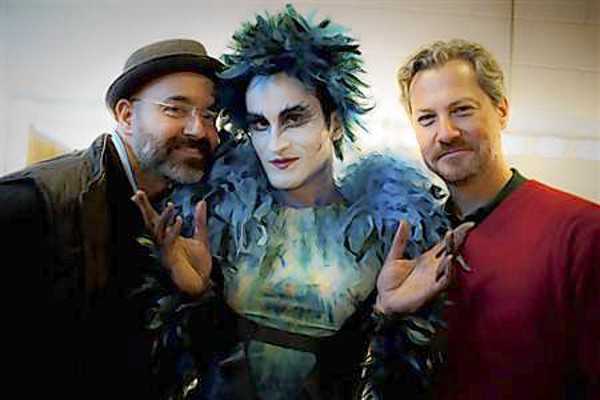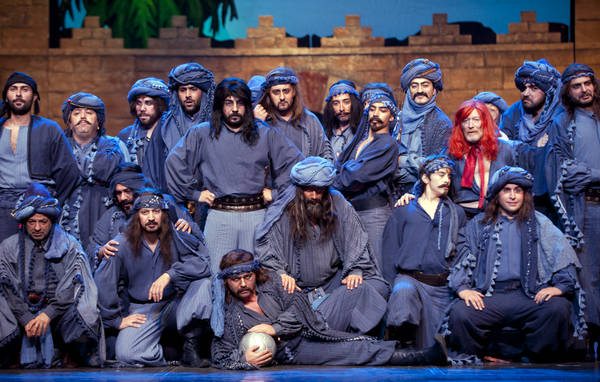To match Feature MOVIE/TURKEY (HANDOUT, REUTERS / January 20, 2012)

ISTANBUL (Reuters) – On a hot summer’s day in 2008, 26-year-old physics student Ahmet Yildiz was shot dead when he popped out from his Istanbul apartment to buy ice cream.
The main suspect in the killing, a fugitive still wanted by Turkish police, is Yildiz’s father, who could not accept that his only son was in a homosexual relationship.
The case, widely believed to be Turkey’s first gay “honor killing”, has inspired a movie “Zenne”, which opened on January 13 and explores gay sexual identity and prejudice in overwhelmingly Muslim Turkey.
“We had the movie idea in mind right after our dear friend Ahmet was killed,” said Caner Alper, writer and co-director of the movie. “His story needed to be told.”
Yildiz was born into a wealthy religious family in the ancient city of Sanliurfa, in Turkey’s impoverished and conservative southeast, but moved to cosmopolitan Istanbul during his university years, seeking more freedom as a gay man.
In Istanbul, Yildiz started a new life and made new friends; he also began a gay relationship and eventually moved in with his boyfriend, who witnessed Yildiz’s murder from the window of their apartment on the Asian side of the city divided by the Bosphorus Strait.
In the movie, Yildiz’s character is encouraged to come out of the closet by a male belly dancer, or zenne, and a German photographer who has moved to Istanbul after a personal crisis in Afghanistan, where he accidentally caused the death of several children during a photo shoot. Both are fictional characters.
In real life, Yildiz’s coming out as a gay man was seen as an affront in his deeply patriarchal and tribal family, even though his parents adored him, a cousin, Ahmet Kaya, told the Human Rights Foundation of Turkey.
LOOKING FOR A “CURE”
Yildiz’s father had urged him to return to their village and to see a doctor and an imam to “cure” him of his homosexuality and get married, but Yildiz refused.
“Ahmet loved his family more than anything else and he was tortured about disappointing them,” Kaya was quoted as saying in the foundation’s report.
After he was killed, the family did not claim Yildiz’s body for a proper Islamic burial — an indication of the deep shame the family felt and that they had ceased to consider him one of their own. He was buried instead in a “cemetery for the nameless.”
“The one scene I wasn’t able to distance myself from the character I played as an actor was when Ahmet apologized to his father for being gay on the phone after coming out,” Erkan Avci, a young actor who played Yildiz, told Reuters.
“It’s such a great tragedy, so cruel and inhumane that anybody has to apologize for who he is.”
Avci drew parallels between Ahmet’s situation and his own as a Kurd from Diyarbakir province in a country whose Kurdish minority has long complained of discrimination and inequality.
“It would have been immoral for me to turn down this role, as a man who had to apologize for years for being Kurdish,” he said.
“Zenne”, which won five awards at Turkey’s most prestigious film festival, the Antalya Golden Orange, has received a huge amount of attention in mainstream media and is reported to be having reasonable success at the box office.
With a $1 million budget, including financial support from the Dutch embassy, it opened in a luxury movie theatre in one of Istanbul’s most fashionable neighborhoods.
Gays are normally depicted in Turkish movies as colorful and exaggerated secondary characters who add a comic element – hardly the main character of a story.
“Zenne” tackles head-on such sensitive issues as gay society, prejudice and equal rights for Turkey’s lesbian, gay, bisexual and transgender (LGBT) community.
“‘Zenne’ is a very special film for us. It brings to the screen some of the important issues for the LGBT cause such as hate crimes, the complications for gay men to forego the mandatory military service and coming out,” said Umut Guner, spokesman for the Ankara-based Kaos GL, a LGBT group.
PREJUDICE
The film has not been welcomed in conservative circles.
Islamist daily Vakit called it “homosexual propaganda” by a gay lobby bent on “legitimizing perversion through their so-called art.”
Despite being the only suspect, Yildiz’s father is still at large and is being tried in absentia.
Friends and activists, who have attended some of the hearings wearing masks bearing Yildiz’s portrait, say the authorities lack the will to find the perpetrator.
Alper and Mehmet Binay, co-directors of the movie and together as a gay couple for 14 years, said they heard their friend Yildiz receive death threats from his family over the phone.
Yildiz filed an official complaint but failed to receive any protection, they said.
“Honor killings,” or crimes carried out against mostly women and young girls seen to have tainted the family’s name, are not uncommon in Turkey, particularly in poor and rural areas.
The European Union, which Turkey wants to join, has repeatedly urged Ankara to take a tougher stance against such crimes.
MILITARY PRACTICES
Turkey is often held as an example in the Middle East for marrying Islam and democracy, but Turkish gay activists say Ankara’s human rights record is far from perfect.
One practice particularly abhorred by rights groups is the method by which gay men can be exempted from the required 16-month military service: they have to prove their homosexuality in medical tests and are compelled to provide photos of them having sex with other men.
In the movie, two characters undergoing one such examination are forced to wear make-up and dress in women’s clothes, while doctors perform anal examinations.
According to Article 17 of the health regulations of the Turkish Armed Forces, homosexuality is considered a “psychosexual deviance.”
“Turkey is going through a democratization process, and the army needs to enter this phase, too,” said Binay.
“We don’t live in a dream world and we don’t expect it to happen all of a sudden in such a deep-seated institution, but at least they could stop the humiliating practices against gay men.”
Turkish rights groups reported 24 killings of gay and transsexual individuals in the last two years. In most cases, courts reduced the sentences or the perpetrators were not found.
In a report last year, Amnesty International urged Ankara to draw up laws preventing discrimination on the grounds of sexual orientation and to punish perpetrators of homophobic attacks.
The EU in a separate report also last year said lesbian, gay, bisexual and transgender persons in Turkey “continued to suffer discrimination, intimidation and violent crimes”.
LGBT activists say they get little sympathy from the AK Party, in power for a decade, which has its roots in political Islam and is known for its socially conservative stance.
Selma Aliye Kavaf, Turkey’s former Women and Family Affairs Minister, made waves in 2010 when she said homosexuality was “a biological disorder, a disease that needs to be treated”.
The current interior minister accused an outlawed armed organization with “engaging in every kind of immorality, including homosexuality”.
Director Binay said he hoped the movie would help to change views both among government officials and the wider society, but believed that would not happen overnight.
“These movies will be made in Turkey as long as those from different identities refuse to learn to live together.”
(Editing by Ibon Villelabeitia and Sonya Hepinstall)
(The following story corrects name of newspaper in paragraph 22)





